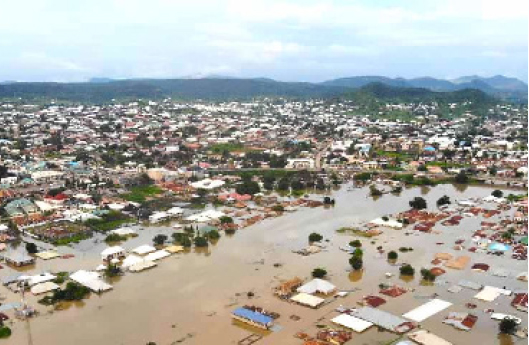Residents of Ogbaru, a riverine community in Anambra State, have been thrown into anguish as heavy flooding has destroyed their farms, roads, and many houses, displacing the occupants.
It was a tale of woes when Hon. Chinedu Uwollo, the chief of staff to the member representing Ogbaru federal constituency, Hon. Victor Afam Ogene, conducted newsmen around the affected communities yesterday.
From Ossomala to the neighbouring Obeagwe, Akili Ogidi, Ogwuikpele, Ogwuaniocha, and many farm camps in the environs, the devastation was horrific. The communities were literally submerged in the raging flood caused by the rising water level in the River Niger.
Ogbaru communities are located on the bank of River Niger.
Already, farmers in the affected communities have embarked on premature harvesting of their crops, incurring huge losses.
For instance, Mr. Adimali Nwachukwu, a yam and cassava farmer in Ogwuikpele, expressed his pain and anguish as he wailed: “The flood has destroyed everything that I have. It has ruined my hopes and wasted my labour. I don’t know where to start. I borrowed money at a high interest rate to invest in large-scale farming this year. I spent a lot on yam seedlings and cassava stems, hoping for a bountiful harvest to recoup my investment and repay my loan. But look at me now. With this flood and premature harvesting, I’m not sure I’ll get up to 25 percent of what I invested in this year’s farming. I’m finished. Where do I start again?” he lamented.
Similarly, a widow, Nwakaego Nwafili, a cassava and maize farmer, narrated her ordeal thus: “This year’s flood is suffocating me. Since the heavy rains started in July, I’ve been having panic attacks, knowing what was to come. I haven’t been sleeping at night; my mind is constantly preoccupied with my farm. I’m heartbroken as I speak to you now.
“All my crops are submerged underwater. I don’t have the funds to hire labourers to harvest them. I’m doing the premature harvesting by myself. I’m ruined. I have no one to turn to. As a widow, I rely on farming to feed and care for my three children after my husband passed away five years ago. Please, tell the government to help us. We’re in dire straits in Ogbaru. This flood is killing us daily,” she said.
Another victim, Mrs Oluchi Nzekwe, also narrated her family’s plight, stating that her husband’s blood pressure had risen since the flood began.
She said the family’s sole means of livelihood was farming, lamenting that the devastating impact of the flood had left them distressed.
She said, “My husband, a proud and responsible father of seven, has worked tirelessly to sponsor their education. Three of our children, including a set of twins, are currently in the university – a milestone we’re proud of, having never had the opportunity for higher education ourselves. However, the flood has thrown us into a severe crisis.
“My husband’s health is deteriorating due to the stress, and we’re helpless to save our farm or crops. We can no longer access our land, and harvesting what is left seems impossible, at the moment. I can only pray for the rains to stop and for government intervention, as we’re overwhelmed,” she said.
The flood victims appealed to the state and federal governments to come to their rescue, alleviating their sufferings and saving their livelihoods.
Uwollor told newsmen that some officials of the National Emergency Management Agency (NEMA), accompanied by some officials of the Anambra State Emergency Management Agency (SEMA)visited Ogbaru in June for a flood simulation and sensitisation exercise.
He said that during the visit, NEMA director-general Mrs. Zubaida Umar said the simulation was a demonstration of the agency’s proactive approach to disaster management, particularly in high-risk flood-prone states like Abia, Anambra and Imo States, as identified in the 2025 Seasonal Climate Prediction by the Nigerian Meteorological Agency (NiMet) and the Annual Flood Outlook.



